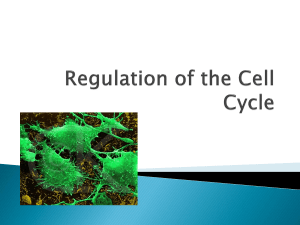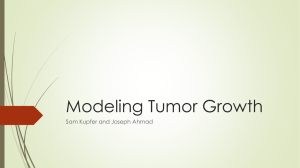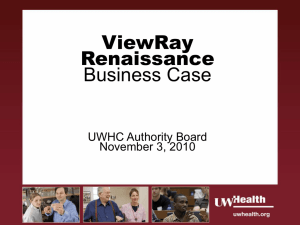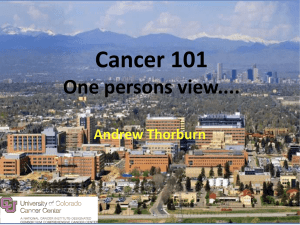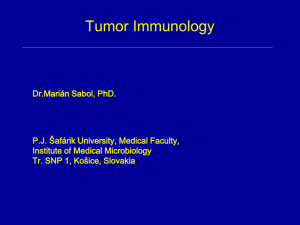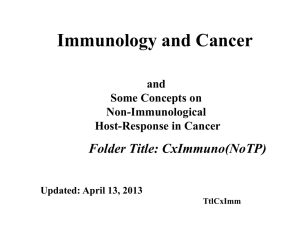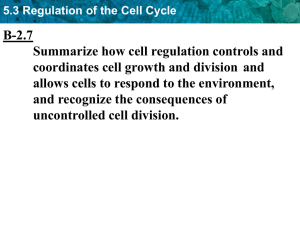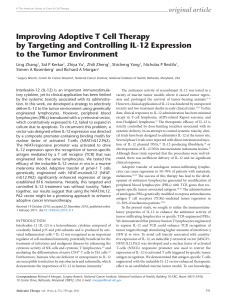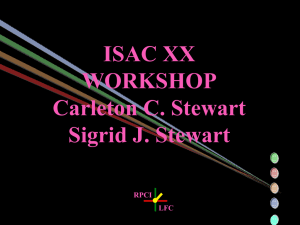From CARS to armored CARS
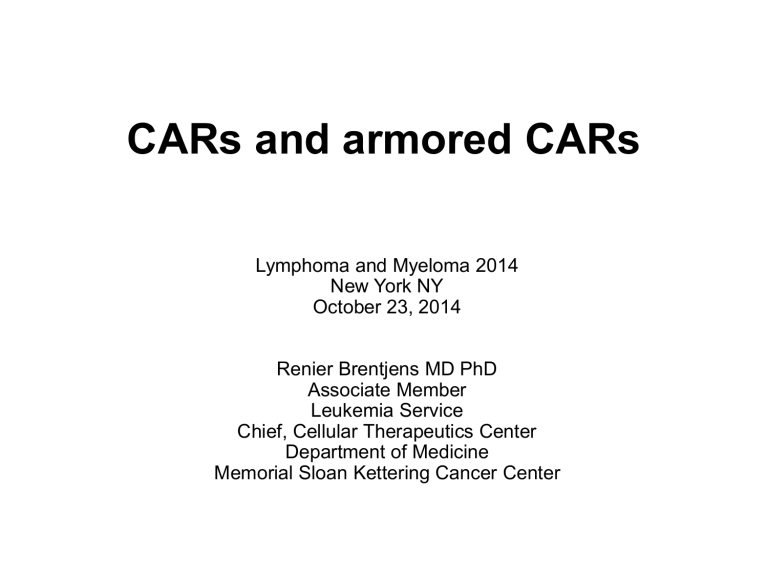
CARs and armored CARs
Lymphoma and Myeloma 2014
New York NY
October 23, 2014
Renier Brentjens MD PhD
Associate Member
Leukemia Service
Chief, Cellular Therapeutics Center
Department of Medicine
Memorial Sloan Kettering Cancer Center
Conflict of Interest Disclosure
Renier Brentjens MD PhD
• Stockholder: Juno Therapeutics (scientific cofounder)
• Royalties: Juno Therapeutics
• Honoraria: none
• Reserch Funding: Juno Therapeutics
• Consultant fees: Juno Therapeutics
• Discussion of off-label drug use: Tocilizumab
Generation of a tumor targeted chimeric antigen receptor (CAR)
α-TAA mAb
TCR complex
α-TAA scFv—CD8-ζ
5 ’ LTR
SD
ψ
SA
α-tumor scFv
V
H
V
L
CD8 ζ chain
CAR retroviral vector
3 ’ LTR
Generation of TAA-targeted
T cells for treatment of Cancer
TAA CAR
Native TCR
αTAA scFv
1. Construct a chimeric antigen receptor (CAR)
CD8
CD3 ζ
3. Transduce and expand patient T cells ex vivo
TAA CAR
2. Subclone CAR gene into a retroviral vector (SFG)
5 ’ LTR
SD
ψ αTAA scFv
V
H
V
L
SA
SFG-CAR
CD8 ζ chain 3 ’ LTR
4. Infuse transduced
T cells to eradicate
TAA + tumor cells
TAA
Advantages of CAR T cell therapy
• HLA-independent antigen recognition, therefore universal application
• Active in both CD4 + and CD8 + T cells
• Target antigens include proteins, carbohydrates and glycolipids
• Rapid generation of tumor specific T cells
• Minimal risk of autoimmunity or GvHD
• A living drug, single infusion
Expression of CD19 and other B cell markers on B lineage cells
preB-ALL
B cell lymphomas and leukemias myelomas
Stem Cell
CD19 pro B
CD22
CD20 pre B immature B mature B plasma cell
Evolution in CAR design
Clinical trials using CD19 targeted T cells in relapsed or refractory B-ALL
Patient characteristics and treatment outcomes
Sci Transl Med. 2013 Mar 20;5(177):177ra38
Clinical Efficacy Outcomes
(n=22)
Characteristics No. of Patients %
Overall Complete Response to salvage chemotherapy
Overall Complete Response to 19-28z CAR T cells (n=21)
In patients with morphologic residual leukemia (n=12)
Complete Remission
(CR)
Complete Remission with incomplete count recovery
(CRi)
Molecular Complete
Remission (CRm) (n=21)*
Time to CR/CRi (days)
8
18
10
14
4
15
22.1
83
36
86
64
18
72
Post CAR T Allo-SCT**
(n=12 eligible patients)
8 67
* mCR or MRD- as determined by flow cytometry and/or deep sequencing for
the index IgH clonotype and/or qPCR for the bcr-abl transcript
** Four patients had medical contraindication to allo-SCT, two patients
in CR have declined potential allo-SCT, one is inevaluable and one is being
evaluated for an allo-SCT
UPenn studies of relapsed B-ALL
• 25 pediatric and 5 adult relapsed or refractory
B-ALL patients treated
• 19-4-1BBz CAR design
• 90% CR
• 6 month EFS 67%
• 6 month OSR 78%
Maude et al N Engl J Med. 2014, 371:1507-17
NCI studies of relapsed B-ALL
• 20 pediatric and young adult relapsed or refractory B-ALL patients treated.
• 19-28z CAR design
• 70% CR (14/20)
• 60% MRD- CR
• 5 month EFS 78% in MRD- patients
Lee et al Lancet. Published online October 13, 2014
The Problem
Clinical trials using CD19 targeted T cells in low grade B cell malignancies
UPenn clinical trial results
Patient
1
2
3
Prior Chemotherapy Conditioning
Chemotherapy
Bendamustine Fludarabine, Rituximab,
Alemtuzumab, R-CVP,
Lenolidomide, PCR
Alemtuzumab Bendamustine/Rituximab
Response
CR (3+ years)
PR (7 months)
Rituximab/Fludarabine,
Rituximab/Bendamustine.
Alemtuzumab
Pentostatin/
Cyclophosphamide
CR (3+ years)
Kalos et al Sci Trans Med 2011
Updated UPenn Trials in CLL
(ASH 2013)
• Abstract 4162
– CD19 CAR T cells treating relapsed/refractory CLL
• Utilizing a 4-1BBz CAR construct, 14 CLL patients treated
• 3/14 patients obtained CR (21%), 5/14 patients obtained PR (36%), 6/14 patients with no response (43%)
• 6/14 patients with persistent detectable CAR T cells (5-35 months)
• No CR patients with reported relapsed disease
• No dose response reported
• Abstract 873
– Dose randomized dose optimization trial of CLL patients with either high or low dose CAR T cell infusions
• Utilizing a 4-1BBz CAR construct, 27 CLL patients treated
• Patients randomized to either low dose (5 x 10 7 CAR T cells) or high dose (5 x 10 8
CAR T cells)
• No dose response benefit seen in these treated patients
• Overall response rate (CR + PR) was 40%
• No correlation with CRS and RR was observed
MSKCC clinical trial results: CLL
No
Cyclophosphamide
Cyclophosphamide
Brentjens et al Blood. 2011 Nov 3;118(18):4817-28
CAR questions
• What is the etiology of differential responses by CAR T cell therapy to relapsed B-ALL versus
CLL?
• What is the role of bulky disease and CAR T cell anti-tumor efficacy?
• The role of the hostile tumor microenvironment and CAR T cell function
• How to build a better T cell?
The hostile tumor microenvironment
The tumor microenvironment contains multiple inhibitory factors designed to potentially suppress effector T cells.
– CD4 + CD25 hi FoxP3 + regulatory T cells (Tregs)
– MDSCs
– TAMs
– Expression of inhibitory ligands by tumor (PD-L1)
– Tumor secretion of T cell suppressive cytokines (TGF-β and
IL-10)
The solution?
Armored CAR T cells
Moving Forward: Armored CARs
IL-12
• A heterodimeric cytokine secreted by activated APCs, neutrophils and macrophages.
• Induces Th1 CD4 + T cell response enhancing IL-2 and
IFNγ secretion
• Enhances T cell clonal expansion and effector function in concert with TCR signaling (signal 1) and CD28 costimulation (signal 2), serving as a signal 3.
• Avoids/reverses T cell anergy
• May overcome Treg mediated effector T cell inhibition
• Recruits and activates NK cells
• Clinical trials in cancer using systemic IL-12 therapy has been limited by severe inflammatory side effects
Syngeneic EL4(hCD19) tumor model
EL4(hCD19)
53%
IV injection
Assess T cell eradication of tumor
Assess T cell homing to tumor
Assess longterm survival of T cells
Assess memory T cell response to rechallenge with tumor mCD19 -/hCD19 +/-
Assess T cell proliferation in vivo
Assess the efficacy of suicide vectors
Determine the side effects of therapy
IV injection
Retroviral transduction with chimeric receptor
Harvest splenocytes mCD19 -/hCD19 +/-
Lymphodepletion enhances anti-tumor efficacy of 19z1 + T cells
100
80
60
40
20
0
0
Cytoxan + 19z1
No Cytoxan + 19z1
Cytoxan Pz1
1Élive cells
10
4
24.3
10
3
10
2
24.3%
0.11
6Élive cells
10
4
2.07
10
3
0.02
2.07%
10
2
10
1
10
0
10
0
97.6
10
1
10
2
FL1-H: mCD19
10
3
0.29
10
4
10
1
10
0
10
0
75.5
10
1
10
2
FL1-H: FL1-Height
10
3
0.063
10
4
60 10 20 30 40
Tim e ( d)
Days since tumor cell injection
50
19z1IRESIL-12 modified T cells secrete biologically active IL-12 and exhibit enhanced targeted cytotoxic function and resistance to Tregs
B
A
C
40
30
20
10
0
*
*
*
*
1:1 2.5:1 5:1
E:T ratio
19mzIRESIL-12
19mz
10:1
D
Pegram et al Blood 2012
Syngeneic IL-12 secreting CD19 targeted
T cells induce B cell aplasias and tumor eradication
A B
Pegram et al Blood 2012
IL-12 secreting CAR T cells in vivo efficacy
IL-12 genetically modified T cells: Armored
CAR T cells
Targeted tumor cytotoxicity
NK cell
NK cell
Recruitment and activation
IL-12 secretion
Tumor cell
Targeted tumor cytotoxicity
Targeted tumor cytotoxicity Activated
TIL
Reversal of anergy
Anergic
TIL
CAR-IRES
IL-12
IL-12 secretion
IL-12 secretion
Enhanced CM phenotype, enhanced cytotoxicity, enhanced persistence
Resistance to Treg and TGF β inhibition
Conclusions
• Autologous CD19 targeted CAR modified T cells have demonstrated very promising anti-tumor efficacy in B cell ALL with more modest responses in patients with low grade B cell malignancies.
• Etiologies of CAR T cell resistance may be related to the hostile tumor microenvironment.
• Application of CAR T cell therapy for low grade B cell malignancies as well as moving forward towards application to solid tumor malignancies requires
“armored” CAR T cells designed to both overcome the hostile tumor microenvironment and exhibit enhanced anti-tumor efficacy and long term persistence.
• “Armored” CAR T cells appear to have enhanced anti-tumor efficacy based on pre-clinical tumor models.
• Future studies using “armored” CAR T cell technology will focus on translation of these armored CAR T cells to the clinical setting both in the context hematological as well as solid tumor malignancies.
Renier Brentjens
Hollie Pegram
Mythili Koneru
Sarwish Rafiq
Swati Pendharkar
Eric Smith
James Lee
Yan Nikhamin
Jae Park
Kevin Curran
Peter Chang
Michel Sadelain
Marco Davila
Michael Gong
Jean Baptiste Latouche
Leukemia Service
David Scheinberg
Jae Park
Martin Tallman
Mark Frattini
Peter Maslak
Mark Heaney
Joe Jurcic
Nicole Lamanna
Marco Davila
Dan Douer
Cell Therapy and Cell
Engineering Facility
(Isabelle Riviere, Director)
R&D, Manufacturing
Xiuyan Wang
Jolanta Stefanski
Malgorzata Olszewska
Oriana Borquez-Ojeda
Teresa Wasielewska
Jinrong Qu
QA/QC
Shirley Bartido
Yongzeng Wang
(Mark Przybylowski)
James Hosey
Domenick Pirraglia
(Vanessa Capacio)
Clinical Research
Yvette Bernal
Lymphoma Service
Craig Moskowitz
Ariela Noy
GYN service
Samith Sandadi
Roisin O ’ Clearbhail
Adult BMT Service
Sergio Geralt
Craig Sauter
Department of Clinical
Laboratories
Lillian Reich
David Wuest
Kathy Smith
Biostatistics
Glenn Heller
Funding
CA59350 (MS) ; P30 CA-008748 (CT); 3RO1CA138738-02S1(RJB); Alliance for Cancer Gene Therapy ; Terry Fox Run for Cancer Research; William H. Goodwin and Alice
Goodwin, and the Commonwealth Cancer Foundation for Research and the ETC of MSKCC; Damon Runyon Clinical Investigator Award (RJB); William Lawrence &
Blanche Hughes Foundation (RJB); CLL-Global Research Foundation (RJB)
